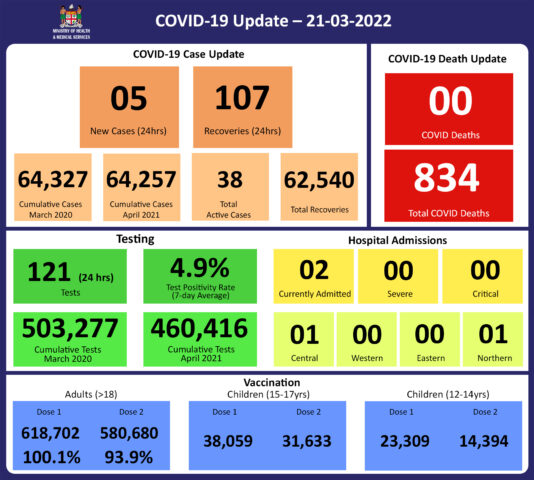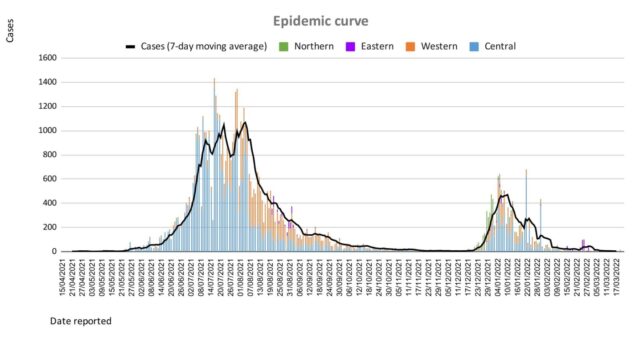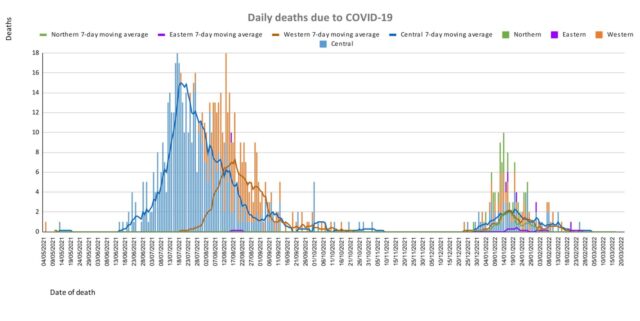COVID-19 Update 21-03-2022
COVID-19 Update
Monday 21st March
Public Advisory:
COVID-19 Vaccination
At the global level, WHO had advised that the acute phase of the pandemic could soon be over but it would depend on how quickly we meet the target to vaccinate 70% of the population in each country, among other factors. There is a resurgence of COVID in Europe, China, NZ, and Australia. In the past couple of weeks, the UK and several countries in Europe, including Germany, France, and Switzerland, are experiencing a new wave. At least 12 countries, geographically extending from Finland to Greece, are experiencing new increases in cases, some quite marked, such as Austria exceeding its pandemic peak, and Finland with an 85% increase from the prior week. Many of these countries are also showing a rise in hospital admissions.
While we have not seen a new major variant, there are many reasons to expect that this is possible in the months ahead. There are well documented extensive animal reservoirs and cases of spillover to humans, there are a large number of immunocompromised people globally in whom the virus can undergo accelerated evolution, and the ongoing lack of containment of the virus globally.
COVID is endemic in Fiji and as such the risk of resurgence will be to the unvaccinated, those with waning immunity, and those who have not had a vaccine booster dose. More importantly, the vulnerable among us will be susceptible to severe disease and death (even if they are vaccinated) when compared to the non-vulnerable group. Also, the non-vulnerable and mobile (e.g. young adults and adolescents) will always be able to transmit disease to the vulnerable. We expect that with the upcoming general elections, population mixing will be unavoidable.
Our vaccination coverage stands at 87% of the population 12 years and over and we have quite a lot of post-infection acquired immunity in the population. While this is good, unfortunately in terms of protection:
- We expect decreasing immunity from the 2 doses of vaccines as well as decreasing post-infection acquired immunity over time
- Our booster program deployment is very slow.
As of 21st March, a total of 114,144 individuals have so far received booster doses. While members of the public have been advised to obtain their booster dose after at least 5 months from their second COVID-19 vaccine dose, we will shortly be advising a shorter interval period in recognition of the risk of disease surge. Moderna vaccine and Pfizer vaccines are both available for adult booster doses.
Our current booster program has been slowed down by slower uptake and deployment challenges relating to the need to deal with the current surge of leptospirosis, typhoid, dengue fever, and influenza we are facing Fiji-wide. The public is urged to get booster vaccine doses, and the list of vaccination sites is provided daily on the MOH webpage. There is also recent evidence that indicates an increased need to vaccinate children between 12 and 18 years to sustain community-wide protection. So given the competing issues, I have instructed teams to go back to health facilities and do targeted booster programs for the vulnerable and the willing and to focus on our 12 to 18-year-olds through the school vaccination program. Furthermore, we are close to opening an avenue to getting access to paediatric doses of vaccines.
We will continue to monitor the evidence on post-infection immunity based on quality data that is being generated globally. However, until we have a better sense of the role of post-infection immunity, the Ministry of Health will continue to define our level of protection based on vaccination numbers
Given the current stocks of Pfizer vaccine we have we will be using Pfizer for the ongoing primary 2 dose schedule of children and adults and as the booster dose.
Influenza
The current surge in influenza cases has added further strain to our outpatient care capacity, as we continue to see a high number of LTDD cases in our communities, while also continuing our efforts to support COVID-19 vaccination needs. These factors together only increase the pressure on all healthcare services, especially our outpatient facilities.
Before the pandemic, Fiji’s influenza season typically began in January and ended by May/June. However, in 2020 and 2021 there was a marked decrease in cases of influenza detected, a trend that was also seen in other countries. It is likely that public health and social measures deployed for COVID-19 worked to decrease other respiratory viruses, including influenza. The current increase in cases suggests a return to pre-pandemic levels of seasonal influenza, however, it is also possible that decreased incidence of influenza in recent years will have led to decreased immunity in the community, and subsequently more people becoming ill than in a usual flu season.
Children under the age of 5 (especially babies) and the elderly are most at risk of severe influenza, and we have published advisories on how to care for oneself and for children with flu, and the symptoms to watch out for especially as related to seeking extra care (https://www.health.gov.fj/influenza/).
The Ministry has been working on measures to open more facilities with extended service hours and to streamline outpatient services to help reduce waiting times. Many of our staff have returned from annual leave that had been deferred during the second and third waves of COVID-19, as well as sick leave during this increase in flu. We have also made adjustments in our outreach programs to deal with LTDD, and vaccination needs, in order to free up staff for outpatients services in health centers to help improve services. The Ministry is also pursuing the engagement of General Practitioners to provide outpatient services to the general public in a public-private partnership arrangement during this surge of Influenza infections.
Leptospirosis, Typhoid fever, and Dengue fever
The current wet weather around the country continues to promote the surge of our endemic climate-sensitive diseases, leptospirosis, typhoid, and dengue fever. Though we have noted a decrease in leptospirosis hospital admissions, we are also aware of continued heavy rain in parts of the country, particularly the Western Division, and surges of leptospirosis cases, hospitalizations, and deaths following such weather events. As such the medical advice we provide needs to be followed, while we continue to mount our public health and clinical response. Please heed our advice to protect yourselves and your loved ones.
Leptospirosis
Prevention
The leptospirosis bacteria is spread to humans through the urine of infected animals, such as cows, pigs, rats, and dogs. To reduce your individual risk, it is important to understand that exposure to animals, soil, mud, and floodwaters during work or recreational activities increases your risk of infection.
Important prevention measures include wearing full covered footwear at all times when going outdoors, avoiding wading or swimming in flooded waters, using clean fresh water to wash up after exposure to muddy waters, and keeping all food and drinks covered and away from rats. For workplaces, practice good personal hygiene at all times, cover cuts and wounds well, and use protective equipment, especially footwear when in flooded and/or muddy areas.
We are also urging all parents and guardians to prevent children from playing in the mud or swimming in flooded rivers or creeks, and ensure that they wear shoes when outside.
Symptoms and treatment
Early treatment can decrease the severity and duration of the disease. Please seek medical care if you have recently had contact with floodwaters, mud, or animals, and develop the following symptoms: fever, muscle pain, headache. You may also have red eyes, loss of appetite, nausea/vomiting, dizziness, or feel weak.
Leptospirosis can be treated with appropriate antibiotic medications prescribed by a doctor if treatment is sought early. Danger signs for severe leptospirosis include shortness of breath, coughing blood, chest pain, yellow eyes/skin (jaundice), signs of bleeding (including unexplained bruising), decreased or increased urination, difficulty staying awake. Severe leptospirosis is life-threatening, and anyone with these symptoms must be taken to the hospital immediately.
The reports from the recent FEMAT outbreak response visits to the Navosa Subdivision and the Ra Subdivision have shown that when patients are seen early, and the appropriate treatment is provided, the patients were able to be treated successfully at home and not require admissions into the hospital. The number of people with severe disease and deaths was all significantly reduced. Therefore, we encourage those who are sick at home to seek treatment early so they can recover quickly from their illness.
Typhoid fever
Typhoid fever is typically found in areas that do not have access to proper toilet facilities and/or clean drinking water. We strongly encourage people who live in rural areas, informal urban areas, and any other areas where access to clean drinking water is limited, to boil all drinking water. We must all also continue to practice basic hygiene measures such as frequently washing hands with soap and water, especially after visiting the toilet and before eating or preparing food.
The preliminary reports from our WASH projects in the Northern division have shown that when communities focus on ensuring good water supply, practising proper hand hygiene, having proper human waste disposal (hygienic toilet facilities), and with complete treatment of those with the disease, outbreaks of typhoid can be stopped in the community; and the overall prevalence of typhoid fever will decrease. Thus, we encourage all our communities to focus on clean and hygienic WASH facilities to stop the spread of typhoid fever in the community.
Dengue fever
We continue to urge everyone to get rid of potential mosquito breeding places, such as empty containers inside and outside your homes that may collect water, including discarded tires, flower vases, and pot plant bases. Protect yourself from being bitten by mosquitoes by using mosquito screens in your homes, and mosquito repellents.
Last Updated on 2 years by Publishing Team



